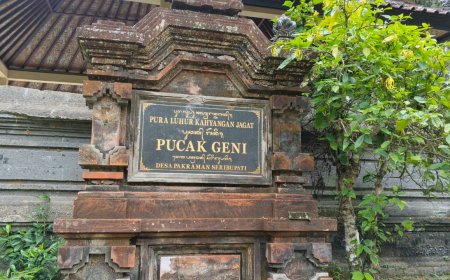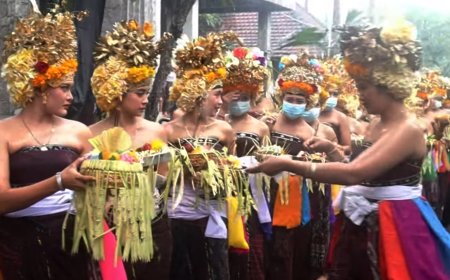The Ngejot Jerimpen Galungan Tradition in Baha Village: The Meaning and Role of Newlyweds in Preserving Balinese Culture
Baha Village, a traditional village in Badung Regency, Bali, continues to uphold customs and cultural traditions passed down through generations. One of the most distinctive traditions in this village is Ngejot Jerimpen on Galungan Day, a ritual rich with meaning and an opportunity to maintain and strengthen bonds among community members. This tradition also holds a special role for newlyweds, who are seen as key figures in preserving this cultural heritage
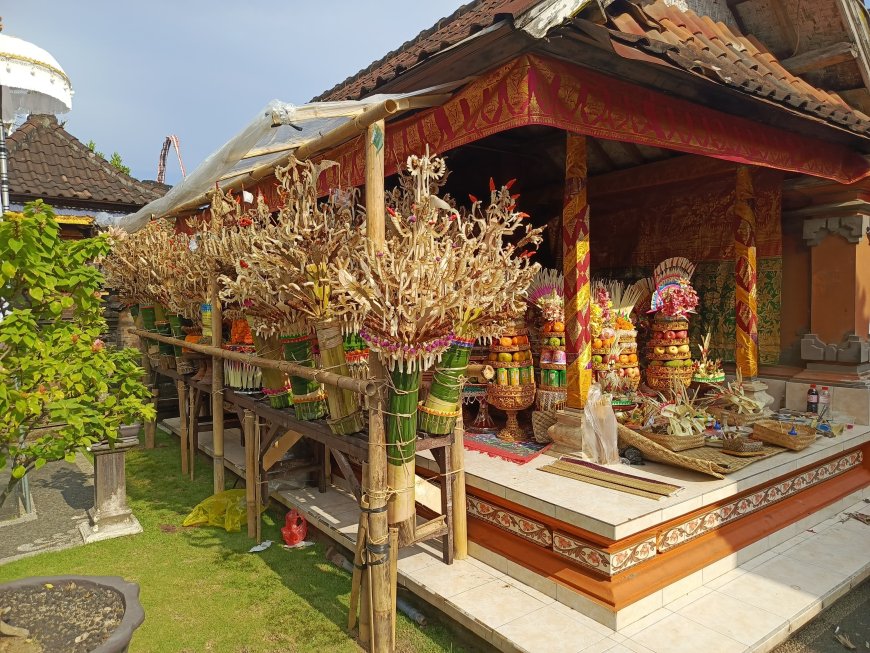
Galungan Day is one of the most significant religious holidays for the Hindu community in Bali. Galungan symbolizes the victory of dharma (truth) over adharma (evil). During this occasion, Balinese people celebrate the arrival of the gods and ancestors who descend to Earth to bless their families. Balinese Hindus hold various ceremonies and religious activities to honor their ancestors and deities, as well as to express gratitude for the blessings they have received. The Ngejot Jerimpen tradition is a form of thanksgiving expressed through sharing food with family, neighbors, and the surrounding community. This tradition is not just about giving or receiving food, it is more about the values of mutual cooperation and unity that culturally and spiritually bind the Balinese community.
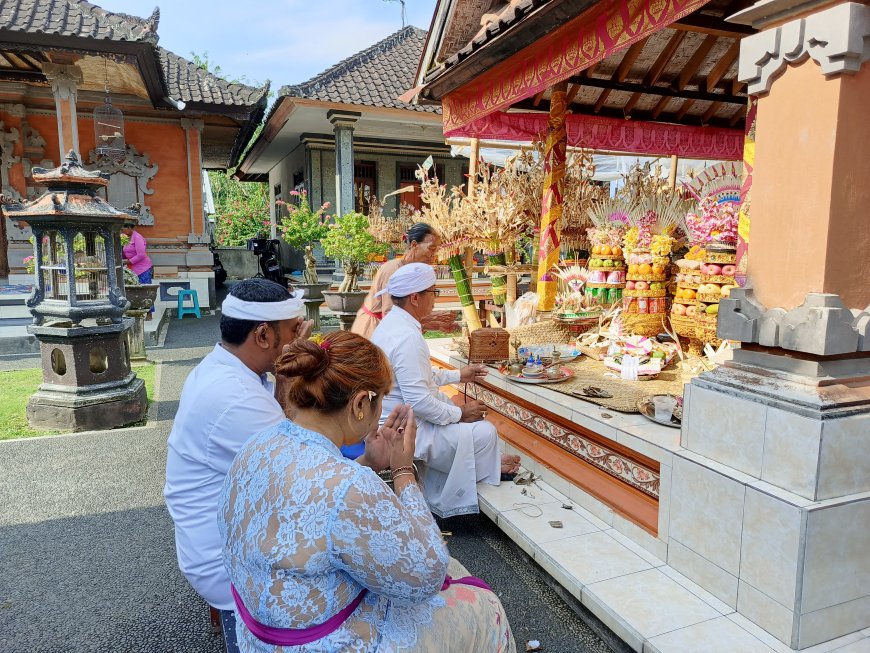
Banten Jerimpen at Bale Dangin (Source: Personal Collection)
Ngejot is a food-sharing tradition practiced on sacred days for Hindus in Bali, such as Galungan, Kuningan, and other religious holidays. In the context of Galungan Day, Ngejot Jerimpen becomes more special as it is performed with greater reverence and significance. The food offered typically consists of rice, side dishes, and traditional Balinese cakes prepared by each family. Jerimpen, in the Balinese language, refers to dishes or offerings specially arranged on a tampah or tray. The rice and side dishes are beautifully decorated, reflecting a deep sense of respect and care in the act of sharing. Ngejot Jerimpen is conducted to mutually bestow blessings upon one another, demonstrating a spirit of caring and strengthening the bonds among community members.
In the Ngejot Jerimpen tradition, newlyweds play an important role. They are expected to serve as role models in carrying out and preserving this tradition. The newlyweds are entrusted by their extended families to prepare the offerings and food that will be shared with the village residents, particularly the respected elders. This aims to help them better understand the significance of Galungan and Ngejot Jerimpen, as well as to learn the responsibilities involved in upholding the tradition.
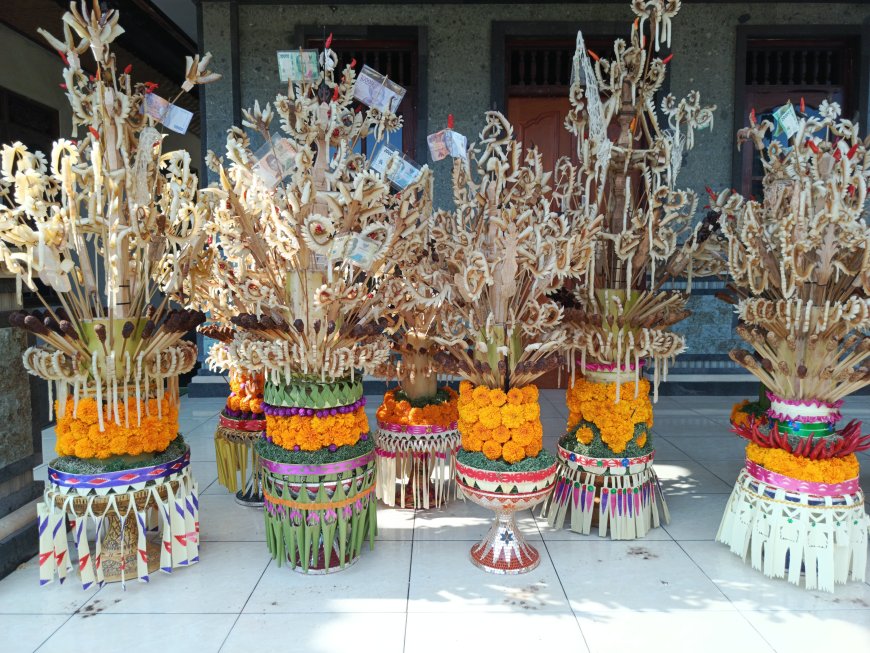
Banten Jerimpen (Source: Personal Collection)
The responsibilities given to the newlyweds serve several purposes. First, to help them learn to respect the values of Balinese customs and culture. Second, to enable them to get to know the villagers better and build closer relationships with the surrounding community. Third, as a means of strengthening family bonds, where the newlyweds collaborate with other family members in preparing food and offerings.Through the Ngejot Jerimpen tradition, the newlyweds are taught the meaning of sharing and honoring the ancestors and deities who descend to bestow blessings. This activity is not just about distributing food, it also strengthens spiritual connections with the community and the surrounding environment. The newlyweds are expected to embody humility, mutual assistance, and gratitude for all the blessings they receive.
In Balinese Hindu teachings, ceremonies and traditions like Ngejot Jerimpen hold profound philosophical significance. The process of giving without expecting anything in return, appreciating every morsel shared, and doing so with a sincere heart become important lessons for the newlyweds. This tradition also serves as a learning opportunity about the meaning of togetherness and unity in maintaining societal harmony.
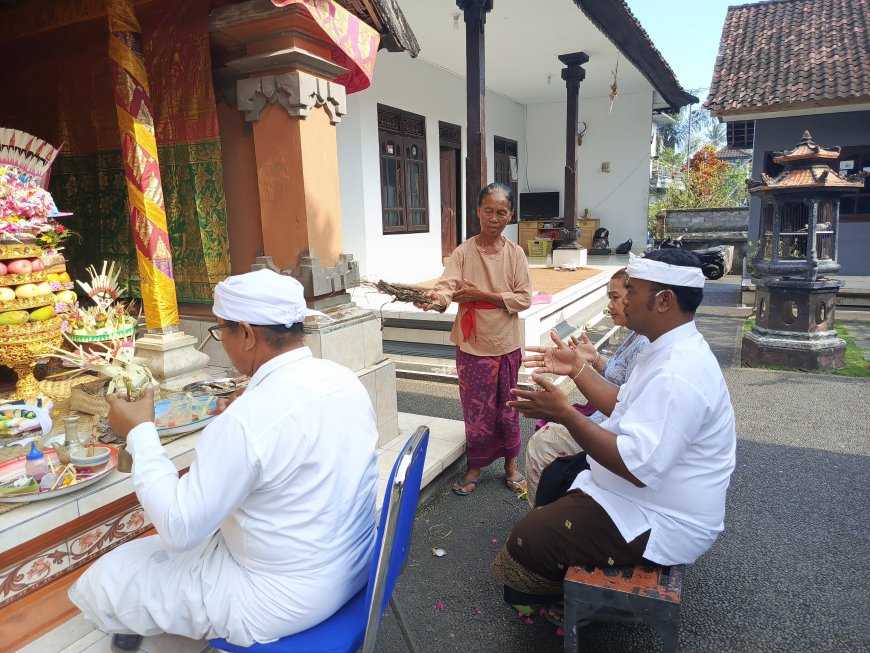
Natap Procession at Bale Dangin (Source: Personal Collection)
On the morning of Galungan Day, each family in Baha Village begins preparing dishes and offerings for Ngejot Jerimpen. Rice, side dishes, and traditional Balinese cakes are meticulously arranged on a tampah. The newlyweds are tasked with helping to organize this food and then delivering it to the homes of villagers. Typically, the newlyweds also wear traditional Balinese attire as a symbol of respect for the customs and traditions they uphold.After the food is distributed, the receiving families offer prayers for blessings for the givers. This creates a warm and meaningful atmosphere among the villagers. Gratitude and good wishes flow through the prayers spoken by the village elders, who believe that this tradition brings goodness and blessings to the entire community of Baha Village.
Although this tradition is still well practiced in Baha Village, challenges in preserving Ngejot Jerimpen persist. The tides of modernization and changing lifestyles often lead younger generations to feel that this tradition is no longer relevant. However, with the involvement of newlyweds, there is great hope that this tradition will continue to be upheld. Community leaders and village elders frequently advise the newlyweds to maintain and practice this tradition. In fact, some families have started involving children and teenagers in the preparation process for Ngejot Jerimpen so they can become familiar with the tradition from an early age. Thus, it is hoped that the younger generation can feel more connected to their traditions and take pride in their culture.




